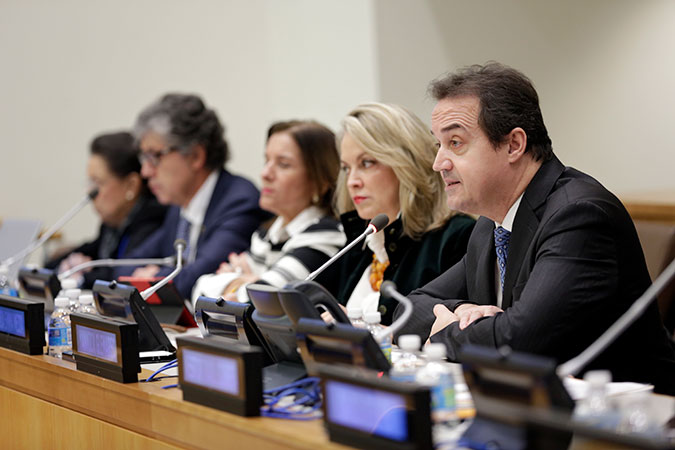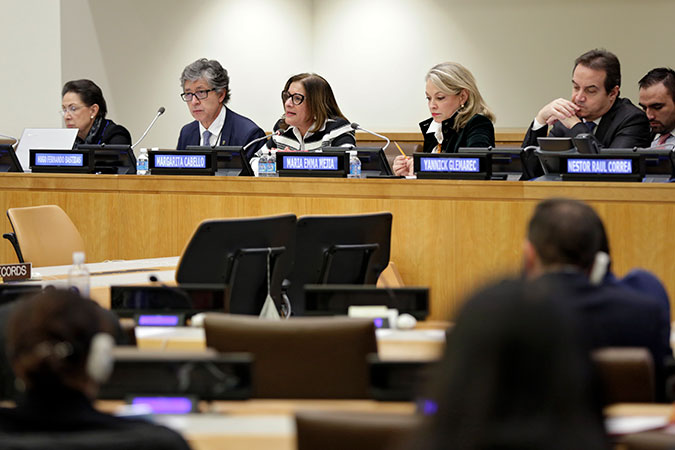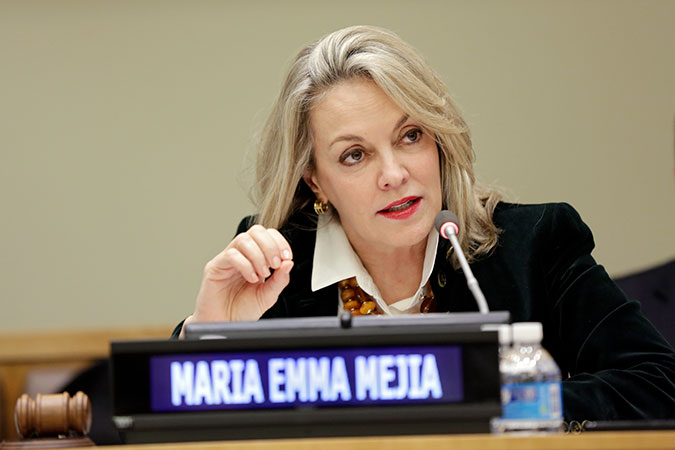Coverage: Towards justice and gender equality to build peace
Date:

Today, at an event in New York, UN Women Deputy Executive Director Yannick Glemarec joined María Emma Mejía, Permanent Representative of Colombia to the United Nations; Margarita Cabello, President of Colombia’s Supreme Court of Justice; Hugo Fernando Bastidas, Chairman of the National Gender Commission; Lucía Arbeláez, former Judge of the Superior Council of the Judicature; Néstor Raúl Correa, former Chairman of the National Gender Commission of the Judicial Branch; and David Steven, Senior Fellow and Associate Director of the New York University’s Center on International Cooperation, to discuss Colombia’s progress and challenges in the pursuit of peace and gender equality.
“In the Colombian peace agreement between the Government and the FARC, the inclusive vision of the justice system is, in a grand part, the result of the strong influence of women in the conversational table,” said Mr. Glemarec. “This moment of building the peace will be crucial for all of us. To end the impunity for gender-based violence is a fundamental mission to strengthen the state of the law and the state of justice, guaranteeing a stable peace and a durable peace,” he added.

The participants explained how Colombia’s Gender Commission, created in 2008, within the Judicial Branch, has involved more than 24,000 magistrates, judges, and administrative employees, as well as users of the justice system to incorporate gender perspectives into the judiciary system. Fully integrating gender equality concerns has entailed practical steps, such as the use of gender-inclusive language in its official documents; trainings on gender issues for judicial personnel and the allocation of resources in the annual budget of the Gender Commission.

According to Margarita Cabello, the second woman to preside Colombia’s Supreme Court of Justice in 130 years, there is still much work to be done. “There is a need to strengthen policies on gender equality that have already heeded results, to support regional work and share the experiences so other countries can replicate what has been done in Colombia,” she said. This was echoed by the Chairman of the National Gender Commission of the Judicial Branch, Hugo Fernando Bastidas, who also emphasized, the need for the judiciary to be strengthened to ensure that the rights of women are well-established and crimes against women don’t go unpunished.
“Es importante contar con mujeres en la presidencia o cargos directivos de Altas Cortes” - Margarita Cabello @CorteSupremaJ #Gender4Justice pic.twitter.com/PBaTMmZua4
— ONU Mujeres (@ONUMujeres) November 30, 2016
The panel also highlighted the high number of displaced people in Colombia, as a result of the conflict which has lasted for 50 years, and the vulnerabilities that women consequentially experience. Therefore, not only is it critical to encourage the participation of women in the peace process, but also guarantee their rights in a post-conflict scenario.
The Government of Colombia, which has been a very active member in the definition of the new development global agenda, recognizes the Sustainable Development Goals as a platform for achieving peace and sustainable development, for which closing the gender gap in all aspects is an essential prerequisite. Colombia was the first country to incorporate the 17 SDG into its National Development Plan 2014 – 2018.